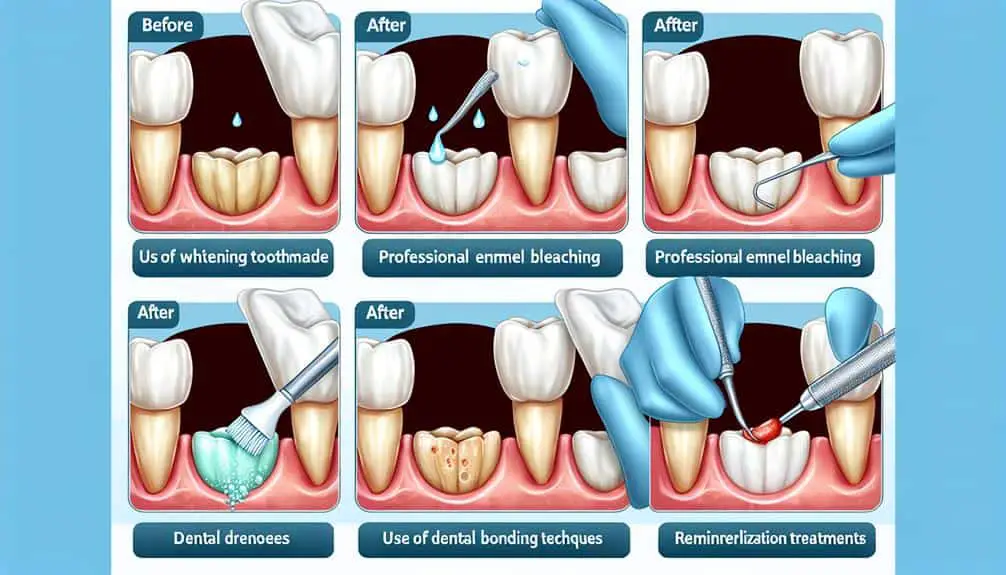Opt for enamel-safe whitening strips to brighten your smile without harming your enamel. These strips are designed to be gentle yet effective, avoiding harmful chemicals that can compromise your teeth' health. By containing natural alternatives like activated charcoal and coconut oil, they guarantee long-term oral health benefits. Prioritize whitening strips that focus on enhancing enamel strength while removing stains to achieve lasting results. Make the choice for a healthier, brighter smile.
Key Points
- Enamel-safe strips protect teeth from harmful chemicals and prevent enamel erosion.
- Natural alternatives like activated charcoal and coconut oil offer gentle yet effective whitening.
- Prioritize enamel health with ingredients like calcium phosphate and fluoride in whitening strips.
- Enamel-safe strips provide long-term oral health benefits without compromising tooth health.
- Consult with a dentist for guidance on choosing the right enamel-safe whitening strips.
Benefits of Enamel-Safe Whitening Strips
Enamel-Safe Whitening Strips offer a gentle yet effective way to brighten your smile without compromising the health of your teeth. When considering the benefits of these strips, it's essential to highlight their natural alternatives and long-term effects on your oral health.
Opting for natural alternatives in teeth whitening is becoming increasingly popular due to concerns about the potential side effects of harsh chemicals. Enamel-Safe Whitening Strips often contain natural ingredients like activated charcoal, coconut oil, or baking soda, which can help whiten your teeth without causing harm to your enamel. These natural alternatives provide a safer approach to achieving a brighter smile.
Moreover, the long-term effects of using Enamel-Safe Whitening Strips are favorable for maintaining healthy teeth. Unlike some whitening products that can weaken enamel over time, these strips are designed to be gentle on your teeth while effectively removing stains. By incorporating enamel-safe whitening strips into your oral care routine, you can enjoy a brighter smile without compromising the health of your teeth in the long run.
Ingredients to Avoid in Whitening Strips
When choosing whitening strips, be cautious of specific ingredients that may potentially harm your enamel and oral health. To protect your enamel, avoid whitening strips containing harmful chemicals such as chlorine dioxide, a bleaching agent that can weaken enamel over time. Hydrogen peroxide is another ingredient to be cautious of, as high concentrations can lead to enamel erosion and tooth sensitivity. Additionally, stay away from strips with ingredients like glycerin and carbamide peroxide, which can also have adverse effects on enamel health.
To guarantee the safety of your enamel, consider opting for whitening strips that use natural alternatives such as activated charcoal or baking soda. These ingredients are gentler on the enamel while still effectively removing surface stains. Natural alternatives offer a more gentle approach to teeth whitening, reducing the risk of enamel damage and promoting overall oral health. Prioritizing enamel-safe ingredients in whitening strips is vital for achieving a brighter smile without compromising the health of your teeth.
Tips for Safely Whitening Enamel
To guarantee the safe brightening of your enamel, it's important to follow these expert tips for preserving the health of your teeth during the whitening process.
When starting on a teeth whitening journey, it's vital to prioritize preventative care. Before commencing any whitening treatment, make sure your oral health is in top condition by visiting your dentist for a check-up. Addressing any underlying issues beforehand can prevent complications during the whitening process.
Additionally, incorporating natural remedies into your oral care routine can help maintain enamel strength. For example, using a mixture of baking soda and hydrogen peroxide as a gentle whitening paste can be effective without causing harm to your enamel. Remember, moderation is key when it comes to whitening treatments. Overuse can lead to enamel erosion, so follow the instructions provided with your whitening strips diligently.
Enamel Protection: Whitening Strip Features
Prioritize the health of your enamel by selecting whitening strips that feature protective elements to safeguard your teeth during the brightening process. When choosing whitening strips, look for specific features that can help restore enamel and cater to sensitive teeth while providing long-term results. Here are three key features to take into account:
- Enamel Restoration: Opt for whitening strips that not only whiten your teeth but also contain ingredients like calcium phosphate to help restore and strengthen enamel. Enamel-friendly strips can protect your teeth from damage and sensitivity during the whitening process.
- Enamel Strengthening: Choose whitening strips that promote enamel strengthening for lasting effects. Look for strips with fluoride or hydroxyapatite, which can contribute to the overall health of your teeth by fortifying the enamel and reducing the risk of sensitivity.
- Long-Term Results: Select whitening strips that offer more than just immediate results. Prioritize products that focus on enhancing the strength and health of your enamel for a brighter smile that lasts.
FAQs About Enamel-Safe Whitening Strips
Choosing Enamel-Safe Whitening Strips involves understanding key FAQs to guarantee effective and safe teeth brightening. One common misconception is that all whitening strips damage enamel. Enamel-Safe Whitening Strips are formulated with enamel-safe ingredients such as hydrogen peroxide or carbamide peroxide, which are safe when used as directed. These strips are designed to remove surface stains without harming enamel when used according to the instructions.
Another frequently asked question is about the impact of whitening strips on enamel health. Enamel-Safe Whitening Strips are gentle on enamel when used correctly. To further safeguard enamel health, it's recommended to use these strips in moderation and not exceed the recommended usage frequency. It's also advisable to consult with a dental professional before starting any whitening treatment to confirm it's suitable for your teeth.
Frequently Asked Questions
Can Enamel-Safe Whitening Strips Be Used by Individuals With Sensitive Teeth?
If you have sensitive teeth, enamel-friendly whitening strips can still be suitable. They offer effective whitening while managing sensitivity. Consider alternatives like desensitizing toothpaste for enhanced comfort. Prioritize both whitening efficacy and sensitivity management for best results.
Are Enamel-Safe Whitening Strips Safe to Use During Pregnancy?
During pregnancy, it's important to prioritize safety. Enamel-safe whitening strips are generally considered safe during pregnancy, but consulting with your healthcare provider is wise to confirm they align with your pregnancy concerns.
How Long Do the Effects of Enamel-Safe Whitening Strips Last?
To maintain long term results from enamel-safe whitening strips, consistency in usage is key. Regular maintenance helps preserve the effects. These strips are designed to have minimal impact on enamel when used as directed.
Are There Any Potential Side Effects of Using Enamel-Safe Whitening Strips?
You may experience minimal potential risks like tooth sensitivity or gum irritation when using enamel-safe whitening strips. However, when used correctly, long-term effects are generally positive with whiter teeth and improved confidence.
Can Enamel-Safe Whitening Strips Be Used on Dental Restorations Such as Crowns or Veneers?
Yes, enamel-safe whitening strips can typically be used on dental restorations like crowns or veneers. However, it's crucial to check product specifics and consult your dentist. While whitening strips are enamel-safe, they may not whiten artificial dental work evenly.



